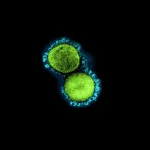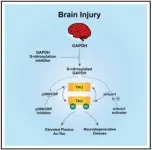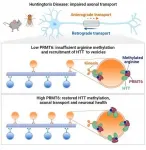NIH experts discuss post-acute COVID-19
Workshop provided venue for discussion
2021-04-13
(Press-News.org) WHAT:
Many people who have COVID-19 make a full recovery and return to their baseline state of health; however, some people have symptoms or other sequelae weeks or months after initial SARS-CoV-2 infection. These heterogeneous symptoms were the subject of the virtual "Workshop on Post-acute Sequelae of COVID-19" hosted on Dec. 2 and 4, 2020, by the National Institute of Allergy and Infectious Diseases (NIAID), in collaboration with other institutes and centers of the National Institutes of Health. A paper published recently in Annals of Internal Medicine describes the workshop. Over 1,200 registered participants including researchers, clinicians, and affected community members discussed what is known about sequelae after COVID-19 and the knowledge gaps that need to be addressed in future research.
The constellation of symptoms and other effects experienced by those who do not return to their baseline state of health after COVID-19 has been referred to by many names, including post-acute sequelae of COVID-19 (PASC), and long or long-haul COVID. Symptoms can be wide-ranging in severity and duration, and may affect numerous organ systems. Reported symptoms include severe fatigue, cognitive dysfunction, and shortness of breath, as well as psychological symptoms, such as anxiety and depression. Longer term effects of COVID-19 have been reported in all age groups and demographics and in persons with asymptomatic, mild, or severe initial COVID-19 illness. If only a small fraction of SARS-CoV-2 infections lead to longer term effects, the global burden of disease will be significant.
In addition to reviewing existing data the workshop presenters identified important knowledge gaps. Notably, the epidemiology is not fully characterized, and it will need to be expanded in order to identify and help vulnerable groups of people. The full clinical spectrum of post-acute COVID-19 is not yet known, nor the reasons why the symptoms manifest so differently in individuals. Underlying pathophysiology is not determined and may be due to SARS-CoV-2 itself, or the immune response to infection.
Since COVID-19 is a new disease, researchers are still documenting the spectrum of recovery and trying to understand the different outcomes patients may experience. People who do not return to their baseline state of health have diverse clinical conditions that will require individualized and multidisciplinary approaches to treatment.
Workshop discussions highlighted that longitudinal studies, ideally including systematic assessments of different organ systems, and including diverse populations, will be needed in order to properly characterize post-acute COVID-19. Careful study of the virus and the immune response to infection may help researchers understand how manifestations of post-acute COVID-19 arise. These research efforts will need to involve a collaboration among clinicians, researchers, advocacy groups and patient communities.
INFORMATION:
ARTICLE:
A Lerner et al. Toward understanding COVID-19 recovery: National Institutes of Health workshop on postacute COVID-19. Annals of Internal Medicine DOI: 10.7326/M21-1043 (2021).
WHO:
Dr. Emily Erbelding, director of the NIAID Division of Microbiology and Infectious Diseases (DMID), is available for comment.
CONTACT:
To schedule interviews, please contact Elizabeth Deatrick, (301) 402-1663, NIAIDNews@niaid.nih.gov.
NIAID conducts and supports research--at NIH, throughout the United States, and worldwide--to study the causes of infectious and immune-mediated diseases, and to develop better means of preventing, diagnosing and treating these illnesses. News releases, fact sheets and other NIAID-related materials are available on the NIAID website.
About the National Institutes of Health (NIH): NIH, the nation's medical research agency, includes 27 Institutes and Centers and is a component of the U.S. Department of Health and Human Services. NIH is the primary federal agency conducting and supporting basic, clinical, and translational medical research, and is investigating the causes, treatments, and cures for both common and rare diseases. For more information about NIH and its programs, visit http://www.nih.gov/.
[Attachments] See images for this press release:

ELSE PRESS RELEASES FROM THIS DATE:
2021-04-13
Researchers have identified molecular signatures of the aging process in mice, publishing their results today in the open-access eLife journal.
Their analyses provide one of the most comprehensive characterisations of the molecular signatures of aging across diverse types of cells from different tissues in a mammal, and will aid future studies on aging and related topics.
Aging leads to the decline of major organs and is the main risk factor for many diseases, including cancer, cardiovascular and neurodegenerative diseases. While previous studies have highlighted different hallmarks of the aging process, the underlying molecular and cellular mechanisms ...
2021-04-13
In the search for life on other planets, the presence of oxygen in a planet's atmosphere is one potential sign of biological activity that might be detected by future telescopes. A new study, however, describes several scenarios in which a lifeless rocky planet around a sun-like star could evolve to have oxygen in its atmosphere.
The new findings, published April 13 in AGU Advances, highlight the need for next-generation telescopes that are capable of characterizing planetary environments and searching for multiple lines of evidence for life in addition to detecting oxygen.
"This ...
2021-04-13
After interviewing various stakeholders from public and private healthcare systems (in Lithuania and the US), researchers Dr Agne Gadeikiene, Prof Asta Pundziene, Dr Aiste Dovaliene from Kaunas University of Technology (KTU), Lithuania designed a detailed structure revealing added value of remote healthcare services, i.e. telehealth. Adopting the concept of value co-creation common in business research to healthcare, the scientists claim that this is the first comprehensive analysis of this kind in the healthcare field involving two different healthcare systems.
According to the researchers, although in the US the consultations via phone with physician have been available for more than fifty ...
2021-04-13
A gene therapy protects eye cells in mice with a rare disorder that causes vision loss, especially when used in combination with other gene therapies, shows a study published today in eLife.
The findings suggest that this therapy, whether used alone or in combination with other gene therapies that boost eye health, may offer a new approach to preserving vision in people with retinitis pigmentosa or other conditions that cause vision loss.
Retinitis pigmentosa is a slowly progressive disease, which begins with the loss of night vision due to ...
2021-04-13
Violent blows or jolts to the head can cause traumatic brain injury (TBI), and there are currently about five million people in the U.S. living with some form of chronic impairment after suffering a TBI. Even in a mild form, TBI can lead to lifelong nerve cell deterioration associated with a wide array of neuropsychiatric conditions. Tragically, there are no medicines to protect nerve cells after injury. Behind aging and genetics, TBI is the third leading cause of Alzheimer's disease (AD), yet the link between these two conditions is not understood.
In a new study, published online today in Cell, researchers have discovered a new way to prevent brain nerve cells from deteriorating after injury, which also revealed a potential mechanistic ...
2021-04-13
AMES, Iowa - Narratives are a powerful tool that can help explain complex issues, but they can also serve as sources of misinformation, which presents a challenge as public health agencies work to educate people about COVID-19 vaccine.
In a paper published by the Proceedings of the National Academy of Sciences, author Michael Dahlstrom, a professor and director of Iowa State University's Greenlee School of Journalism and Mass Communication, examined how narratives or storytelling can help counter misinformation and provide a connection between science and the human experience. Dahlstrom says simply presenting the facts, without some connection, may not help people make ...
2021-04-13
Bottom Line: The U.S. Preventive Services Task Force (USPSTF) concludes that the current evidence is insufficient to make a recommendation about screening for vitamin D deficiency in asymptomatic adults. Vitamin D performs an important role in bone metabolism. Requirements may vary by individual and no one blood vitamin D level defines deficiency. The USPSTF routinely makes recommendations about the effectiveness of preventive care services and this recommendation updates and is consistent with its 2014 statement.
To access the embargoed study: Visit our For The Media website at this link https://media.jamanetwork.com/
(doi:10.1001/jama.2021.3069)
Editor's Note: Please see the article for additional ...
2021-04-13
New research led by the Garvan Institute of Medical Research has revealed how breast cancer cells that develop during or after pregnancy change their environment to form more aggressive tumours.
In experimental models of pregnancy-associated breast cancer, researchers found that cancer cells send signals to the connective tissue around them to trigger uncontrolled inflammation and remodel the tissue, which in turn helps the cancer to spread.
"Breast cancers that arise during or shortly after pregnancy are highly aggressive as they often become resistant to standard therapies. With 50% of cases ...
2021-04-13
Huntington's disease is a genetic neurodegenerative disorder caused by mutations in the protein huntingtin and characterized by involuntary dance-like movements, severe behavioural changes and cognitive impairment. That neuronal traffic is impaired in this disease has been very well known for several years. But that this deranged trafficking could be ameliorated by increasing huntingtin methylation was not yet known. The findings emerged from an international research work coordinated by the University of Trento and published in Cell Reports.
The research teams identified the fundamental role of the protein arginine methyltransferase PRMT6 in ensuring transport along axons, the routes that connect nerve cells to each other, and hence the health of neurons. ...
2021-04-13
Researchers from the group of Hans Clevers (Hubrecht Institute) developed the first patient-derived organoid model for cervical cancer. They also modelled the healthy human cervix using organoids. In close collaboration with the UMC Utrecht, Princess Máxima Center for pediatric oncology and the Netherlands Cancer Institute, the researchers used the organoid-based platform to study sexually transmitted infections for a herpes virus. The model can potentially also be used to study the human papillomavirus (HPV), which is one of the main causes of cervical cancer. The results were published in Cell Stem Cell on the 13th of April.
Cervical cancer is a common gynecological malignancy, often caused by the human papillomavirus (HPV). However, good models to study human ...
LAST 30 PRESS RELEASES:
[Press-News.org] NIH experts discuss post-acute COVID-19
Workshop provided venue for discussion





